Iranian Officials Reiterate Threats Against Israel Amid Regional Tensions
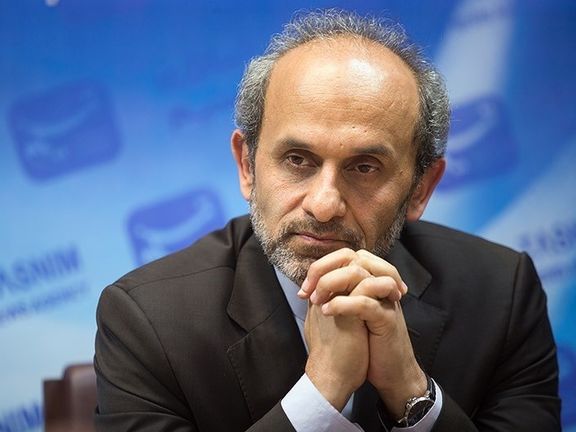
As tensions escalate in the region following the Hamas attack on Israel, Iranian officials have continued to issue threats against the Jewish state.

As tensions escalate in the region following the Hamas attack on Israel, Iranian officials have continued to issue threats against the Jewish state.
Iran has been supporting Hamas and other militant groups, while calling for Israel's destruction in the past four decades.
In the latest comments, the head of the Islamic Republic of Iran Broadcasting, Peyman Jebelli, conveyed a message that they are preparing to broadcast news of Israel's disappearance from the scene. He stated, "Israel is digging its own grave and won't last beyond 2040."
His rhetoric echoes Supreme Leader Ali Khamenei's previous comments from 2015, in which he stated that Israel must be destroyed within 25 years. At that time, the Iranian government even set up countdown clocks in Tehran and other cities, symbolizing the goal. While many Iranians mock the anti-Israel rhetoric and the countdown clock, the regime remains committed to its pursuit.
Regime authorities persistently stress the necessity of "Israel's destruction," a slogan that has been used to justify Iran's substantial financial and military support to militant groups such as Hamas and Hezbollah, while Iranians are facing increasing economic challenges, poverty, and a bleak economic future.
Meanwhile, Gholamreza Soleimani, the head of Iran’s Basij Organization also hinted at the ongoing conflict between Hamas and Israel, suggesting that “significant developments are imminent.” He emphasized that the “ultimate achievement in this conflict's second phase will be the disappearance of Israel.”
It's worth noting that these threats and the regime's anti-Israel stance have sparked mixed reactions among Iranians, highlighting a complex societal divide. The messaging often originates from Supreme Leader Ali Khamenei, with other officials, clerics, and representatives across Iran disseminating and reinforcing these themes in line with the regime's policy.
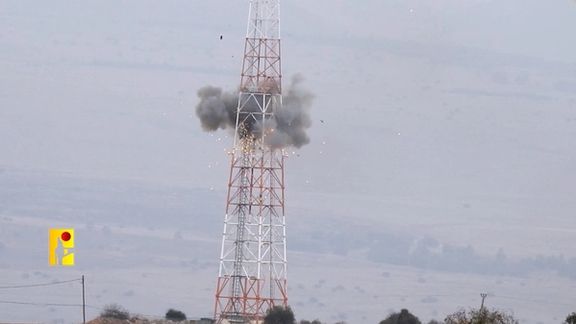
In the ongoing escalation of violence along the Israel-Lebanon border, the Lebanese group Hezbollah has reported firing rockets at an Israeli position on Thursday.
In response, the Israeli military launched an artillery barrage, marking the latest exchange in the most significant border violence escalation in 17 years.
Hezbollah, an Iran-backed group, has stated that 13 of its fighters have been killed in these cross-border exchanges. The tensions began on October 7 when the Palestinian group Hamas attacked southern Israel, prompting an Israeli counteroffensive in Gaza.
Hezbollah claims its fighters used guided missiles to strike the Israeli position in Manara and attacked four other Israeli positions on the same day.
The Israeli military confirmed that fighters in Lebanon fired at least two anti-armor missiles into Israel, hitting the border village of Manara, though no casualties were reported.
In response to the escalating border tensions between Israel and Hezbollah, the US and British embassies in Beirut advised their citizens to leave Lebanon while commercial flight options are still available. Both countries had previously warned against travel to Lebanon.
“We recommend that US citizens in Lebanon make appropriate arrangements to leave the country; commercial options currently remain available,” a US embassy statement said.
The German government also encouraged its citizens to enter their contact information on an online crisis portal and stay updated on the latest safety advisories within the country.
As the situation remains volatile, many countries, including, France, Canada, Australia, Spain, Saudi Arabia, and Kuwait, have issued advisories and warnings regarding travel to Lebanon or encouraged their citizens to leave due to the precarious security situation.
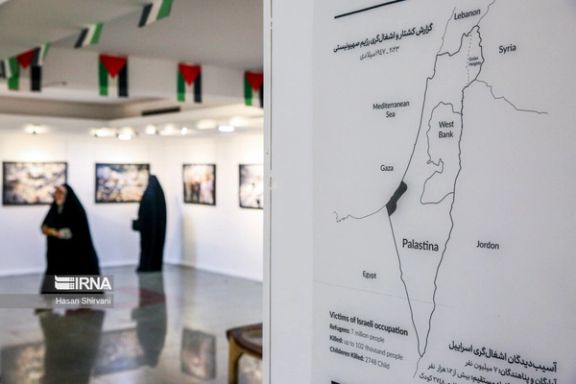
Following a highly controversial attack on a hospital in Gaza, most Iranian newspapers on Wednesday carried several reports and commentaries on the Israel-Gaza war.
Reformist daily Shargh mentioned US President Joe Biden's visit to Israel and suggested that "The United States is making considerable efforts to prevent Israel from falling in the trap of an endless war." However, the newspaper speculated that "Israeli Prime Minister has probably invited Biden to Israel in a move to avoid a defeat after the October 7 attack by Hamas.”
Meanwhile, Shargh quoted an Israel expert, Amir Ali Bojnourdi, as saying that "The main issue that has so far delayed Israel's ground offensive is a difference of opinion between Netanyahu and the US government, not the possibility of a reaction by Iran or Hezbollah." However, the daily did not elaborate on the nature of the alleged differences between Israel and America.
Etemad, another leading reformist daily in Tehran, interviewed former diplomat Qasem Mohebali about the impact of the Gaza war on Iran. Mohebali suggested that the war in the region poses both a threat and an opportunity for Iran. He argued that if the developments in the region are appropriately managed, it could even help to mend the ties between Iran and the West. However, he emphasized that the outcome would depend on Iran’s diplomatic actions.
On the other hand, Mohebali expressed concerns about the war spilling over into the region, posing significant threats to Iran. He warned that a larger regional war would not just involve Iran and Israel but could also draw in other players. He noted the dangerous divide among people in European cities and in the region, with one group supporting Israel and the other Palestinians. However, he argued that the majority of the world's population supports the Palestinians, as opposed to a smaller group defending Israel.
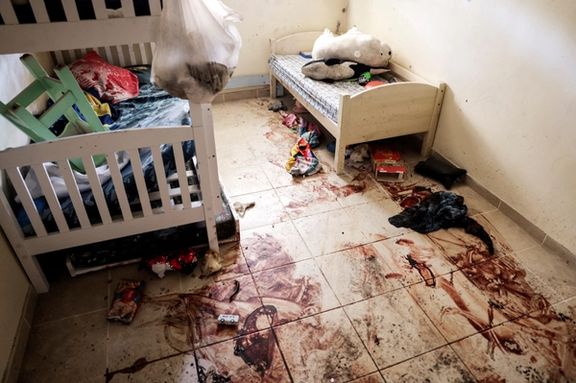
The hardline Daily Farhikhtegan claimed that the attack on the Al-Ahli Hospital was part of "a US plot to garner support for Israel within the community supporting Israel." The hardline paper also contradicted itself, suggesting that the attack aimed to delay Israel's ground offensive against Gaza. Farhikhtegan then tried to support its controversial views by citing IRGC-linked Tasnim news agency, which is often criticized for spreading disinformation and fake news and cannot be independently verified.
Elsewhere, Farhikhtegan quoted Russian President Vladimir Putin, who characterized the attack as a catastrophe, in a common practice by hardline media in Iran, who often cite Russian officials to support their anti-Israel or anti-West claims.
Aftab Yazd, a daily affiliated with the left-wing Militant Clerics Association, presented a wild speculation that Biden's visit to Israel indicates that the United States no longer supports Netanyahu, the Likud Party, and Israeli hardliners. Commentator Ali Bigdeli stated that the arrival of US and German officials and the CENTCOM commander in Israel suggests that growing dissatisfaction with Netanyahu's policies has shifted military command operations to other powers.
Bigdeli said, "Although the United States is known as Israel's biggest supporter, but the arrival of all these political and military figures in Israel shows that the White House no longer trusts Netanyahu."
He also added that "The United States will never allow Netanyahu to endanger long-term US interests in the region with his crazy adventurism which is aimed at taking revenge on Hamas."
One of the strangest opinions in the Iranian newspaper commentaries appeared in an article by Hossein Shariatmadari, the editor of the Khamenei-controlled Kayhan. He argued, "Opening a new front against Israel by the region's resistance is inevitable," a stark contrast to Khamenei's claims about trying to contain conflicts.

AUS Navy warship on Thursday intercepted three cruise missiles and several drones launched by the Iran-backed Houthi militants from Yemen.
While Washington is on heightened alert for activity by Iran-backed groups as regional tensions soar during the Israel-Hamas war, the Pentagon said that the projectiles were potentially fired toward Israel.
The Pentagon said the destroyer USS Carney was operating in the northern Red Sea on Thursday when it brought down the projectiles and there were no injuries.
"We cannot say for certain what these missiles and drones were targeting, but they were launched from Yemen heading north along the Red Sea, potentially towards targets in Israel," Pentagon spokesman Brigadier General Patrick Ryder told reporters.
Earlier in the day, US forces in Syria also brought down two hostile drones, leading to some minor injuries. The attack took place on Wednesday against US forces at Al-Tanf base, near Syria's borders with Iraq and Jordan. Unnamed US officials did not say who was responsible for the attack, but Iranian backed militia groups have targeted the bases multiple times in the past.
The United States has sent a significant amount of naval power to the Middle East in the past week, including two aircraft carriers, their support ships and about 2,000 Marines.
While the White House says there are "no plans or intentions" for their use, it means US military assets would be in place to provide support to protect US national security interests if needed. The US also has an array of bases in the Middle East with troops, fighter aircraft and warships.
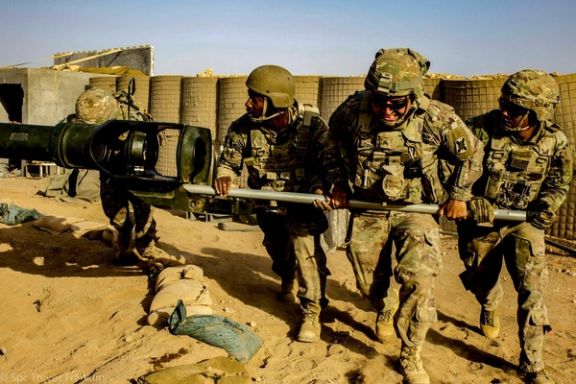
US forces in Syria brought down two hostile drones, leading to some minor injuries, US officials said on Thursday, with Washington expecting activity by Iran-backed groups.
The officials, speaking on condition of anonymity, said the attack took place on Wednesday against US forces at Al-Tanf base, near Syria's borders with Iraq and Jordan.
The officials did not say who was responsible for the attack, but Iranian backed militia groups have targeted the bases multiple times in the past.
Lebanon's Iran-aligned Al Mayadeen TV and Fars News in Iran, affiliated with Revolutionary Guard, both reported on Thursday that two US military bases in Syria have come under attack.
Al Mayadeen reported a drone attack on the Al-Tanf base and a missile attack on the Conoco base in the countryside of the northern Deir al-Zor region. It gave no further information.
US military forces in Iraq were targeted on Wednesday in two separate drone attacks, with one causing minor injuries to a small number of troops even though the US military managed to intercept the armed drone.
Since Iran-backed Hamas declared war on Israel on October 7 after an invasion by air, land, and sea, there has been significant concern that the regime will activate its other proxies in the region on Israel's borders with Lebanon and Syria, and further afield including its Yemeni proxy, the Houthis.
The United States has 2,500 troops in Iraq, and 900 more in neighboring Syria, on a mission to advise and assist local forces in combating Islamic State, which in 2014 seized swathes of territory in both countries.
With Reporting by Reuters
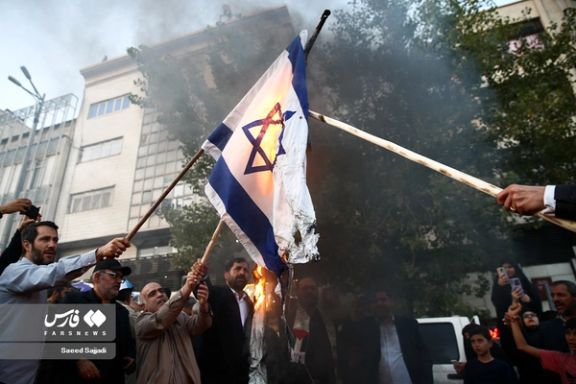
The Islamic Republic of Iran revealed again on Wednesday that it exerts considerable pressure on the country’s tiny Jewish community to denigrate Israel.
The Tehran-born Beni Sabti, an expert on Iran from the Israeli National Security and Strategy Institute, told Iran International that the Islamic Republic strong-armed the Tehran Jewish community into condemning Israel on its Telegram channel for its efforts to defeat Iran’s ally, Hamas.
“Every conscience of every free human is hurt now because of this news about this hospital that people were killed by an enemy who has no conscience and is very violent, “ wrote the Tehran Jewish community in a reference to Israel as the “enemy.”
The Tehran Jewish community, which serves as an umbrella organization for the country’s estimated 9,000 Jews, blamed the Tuesday bombing of a hospital in Gaza on Israel that resulted in casualties. However, a spokesman for Israel Defense Forces, Rear Admiral Daniel Hagari, said the Iran-backed Palestinian Islamic Jihad (PIJ) terrorist organization was responsible for the explosion at the medical center.
“An analysis of IDF operational systems indicates that a barrage of rockets was fired by PIJ terrorists in Gaza, passing in close proximity to the Al Ahli hospital in Gaza at the time it was hit,” said the IDF.
As more direct evidence emerged, it has now become clear that a Palestinian rocket hit the parking lot of the hospital setting several cars on fire and leaving behind a small crater on the ground. No one really knows the number of casualties, although Palestinians first claimed 300 were killed, and then the number of 500 and even a 1,000 were mentioned.
President Biden agreed with the IDF assessment while visiting the Jewish state on Wednesday. The US government has classified both Hamas and the PIJ as foreign terrorist organizations.
Sabti, who speaks fluent Persian and has extensively documented the clerical regime’s repression of Iranian Jews, said that “There is another war in Israel and they are afraid Muslims will come and attack them. They are afraid. This war is much bigger and dangerous. And they have to be more loyal than the revolutionaries in Iran.”
The Tehran Jewish community also wrote on Telegram: "The conscience of every freedom loving individual considers respect for fellow human beings and protecting innocent lives at hospitals one of the pillars of humanity. But savages and criminals in history have no trace of humanity and conscience in their existence and spill the blood of innocent people."
The text written to reflect the ideological rhetoric of the Iranian regime, went on to say, "Unfortunately, this crime by the fabricated and inauspicious regime has been committed with the support of arrogant powers that have always slaughtered innocent people throughout the history of man. This desperate act will clearly encourage all freedom lovers all over the world to fight the Zionist regime and defend the rights of the Palestinians."
The “arrogant powers” is a phrase referring to the United States.
The Jewish community did not name Israel but instead used the commonly used pejorative phrase invoked by Tehran’s media and rulers -- the Zionist regime -- in its Telegram post. Sabti said by omitting Israel’s, the community showed its conformity with the official jargon of the Islamic Republic.
The Iranian regime's injection of fear and propaganda into the Persian Jewish community is not a new state tactic. The now-defunct totalitarian German Democratic Republic exploited its tiny Jewish community to advance its anti-Israel and antisemitic policies. In 1967, the GDR secured a letter from some German Jews in the East German communist state who lashed out at Israel (and sided with the Arab regimes) for its pre-emptive war to stop the invasion of Arab armies in 1967,
Sabti also provided Iran International with a video of the Iranian Rabbi Yosef Lalezar, who condemned Iran.He is the Rabbi for the Iranian city of Shiraz. Sabti said Lalezar’ diatribe against Israel mirrored the language of the Tehran Jewish community but the Rabbi used the phrase “Zionist regime” that is “responsible for the crime at the hospital.”
He added that the Jewish leadership “can condemn Israel with lighter words” but “They are afraid that the revolutionaries will come and attack them.”
Sabti said a picture of the former IRGC commander Mohsen Rezaee is circulating on social media along with the message that if Israel makes any mistakes and attacks Iran or its allies, the 10,000 Jews in Iran will pay a very heavy price.
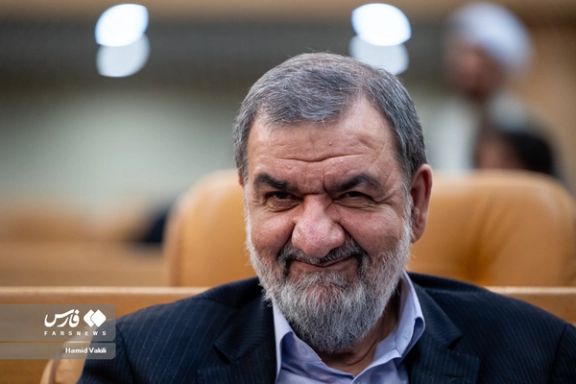
The Iran expert said it is fake news and was distributed two years ago, but many Iranians Jews believe the Rezaee story.
Sabti said “There is an expectation that they condemn Israel. They see the threat and it is coming. For them it is real. In 2008 and 2009, when there was another war between Hamas and Israel, a Jewish Iranian told me that some regime supporters went to Jewish shops and said they will take the businesses to avenge what is happening it is Gaza.”
Iran International reported in September that the Tehran Jewish community issued a semi-coded warning to its members not to participate in protests for the one-year anniversary of Mahsa Amini’s murder. The remembrance of Amini coincided with the Jewish New Year on September 16, prompting community leaders to warn Jews to stay off the streets.
Prior to Iran’s Islamic revolution in 1979, Iran’s Jewish population numbered at least 100,000, most of whom fled after Ayatollah Ruhollah Khomeini seized state power.